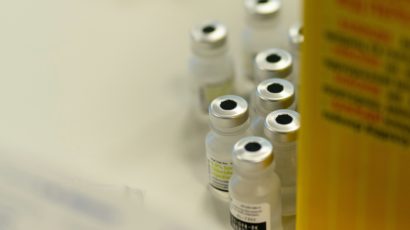Back-to-school health checklist for parents
New shoes, new school clothes, new pencil cases, new friends, and new learning opportunities: the new school year is full of excitement! Perhaps your family has just arrived in Switzerland, or maybe you’ve been here for a while. Whichever the case, “La Rentrée” as we call it in the French-speaking parts, is a great opportunity to tick off this back-to-school health checklist. Make sure you are prepared for what the new academic year has in store for your family’s health.
-
Keep the school in the know
Does your child’s school know about any health problems they have? These could include allergies, asthma, diabetes, seizures or other chronic illnesses, or perhaps physical restrictions affecting their participation in sports or other activities. It is important that staff members are well informed so your child can be helped should they become unwell. Most schools will have questionnaires to be completed at the beginning of each school year where a child’s health problems can be listed. Make sure you give full details.
-
Medication matters
Perhaps your child needs to take medication every day, for example, for asthma or for diabetes. Or it may be that medication needs to be available in an emergency – for example, an EpiPen® during a severe allergic reaction, or medication for a child who has seizures. Whatever the situation, make sure that the school is informed, that you provide the medication, that expiry dates have been checked, and that there are school staff members trained in how to administer it. An individualized care plan should be completed for your child by their doctor, you as their parent, and the school so that everyone agrees and is aware of when and how medication should be given.
For medication that is only needed for short periods, for example eye drops or antibiotics for minor infections, again, ask your child’s school for their specific policy on this. Make sure that you complete any paperwork in full and provide the medication, in its original container, with specific instructions.
-
Vaccinate, vaccinate, vaccinate
It can be easy to miss your child’s vaccination boosters, especially for families moving internationally on a regular basis. Vaccination schedules may also vary a little between countries. The end of the summer holidays is a great time to make sure everyone in your family is up to date. The recommended Swiss vaccination schedule can be found here in French, German and Italian: https://www.bag.admin.ch/bag/fr/home/gesund-leben/gesundheitsfoerderung-und-praevention/impfungen-prophylaxe/schweizerischer-impfplan.html
-
Unwell at school: what’s your plan?
Does the school know how to reach you if your child feels unwell, or in case of an emergency during the school day? For working parents, it can cause disruption if they receive a call from school saying their child is ill. Do you need a back-up plan in place: an extended family member, nanny, neighbour, or friend for example? Keep the school informed and make sure phone numbers are up to date. Also make sure that your child knows the plan.
-
Time for a check-up?
La Rentrée is a great opportunity to include a routine check-up for your child with your family doctor or paediatrician in preparation for the new school year. When was the last time their eyes, hearing, weight, and growth were checked? And what about a trip to the dentist? If you’ve just moved to a new country or new area, ask other parents for advice about good local doctors and dentists.
-
Emergency preparedness
Even if you’re Switzerland-savvy, remind everyone in the family what number to call in an emergency – medical or other. It’s 144 that gets you straight through to an ambulance. But what if you’re over the border in France or Italy, or you pop to London for the weekend? The Europe-wide emergency services phone number is 112. In many cases, this will connect you to the Police (including in Switzerland). They should then be able to patch you through to the emergency service that you need.
A great way to teach young children the Europe-wide emergency services number is for them to think about the fact that they have 1 mouth, 1 nose and 2 eyes, pointing to these as they move up their face!
For families with smartphones, make sure everyone downloads the free EchoSOS App: https://echosos.com/en/. This doesn’t just work in Switzerland but also in many other countries throughout the world. Once you launch the App, it uses GPS coordinates from your mobile phone to detect what country you are in. The emergency service numbers for that country are displayed on your screen. Choose which service you require and can then make your call through the App. Tell the operator you can be located using EchoSOS.com. Your exact GPS coordinates can be transmitted to the ambulance, fire, police, or mountain rescue services.
For those medical situations that are less of an ‘emergency’, use your school parents’ network to learn how to contact a doctor out-of-hours in your local area. Preparing for the worst in advance helps to reduce stress if the need ever arises.
-
Back-breaking backpacks
With books, a packed lunch, pencil cases, sports kit, and other stuff, it’s easy for kid’s backpacks to fill up. They leads to back pain and injury if they’re too heavy and/or are worn for too long. Advice is that a child’s backpack should not weigh more than 10-15% of their body weight. Choose wisely: a lightweight backpack with broad, padded shoulder straps, a padded back and a waist strap is recommended.
-
The dreaded head lice!
One thing that most parents hope to avoid is head lice in the family as a ‘back to school’ gift. Two myths to bust: they like clean hair as much as dirty hair and you should only use treatment if live lice are found. A great video and brochure have been developed by the Children and Young People’s Health Service in Geneva. It is all about head lice, how and when to look for them, and how to treat them. It’s available in English and is worth a look: https://www.ge.ch/comment-savoir-que-faire-si-mon-enfant-poux/head-lice-are-back
With these tips and our back-to-school health checklist in mind, we wish you a healthy and safe new school year. HealthFirst runs many different types of first aid training courses. The details are here: https://healthfirst.ch/for-public/first-aid-training/





